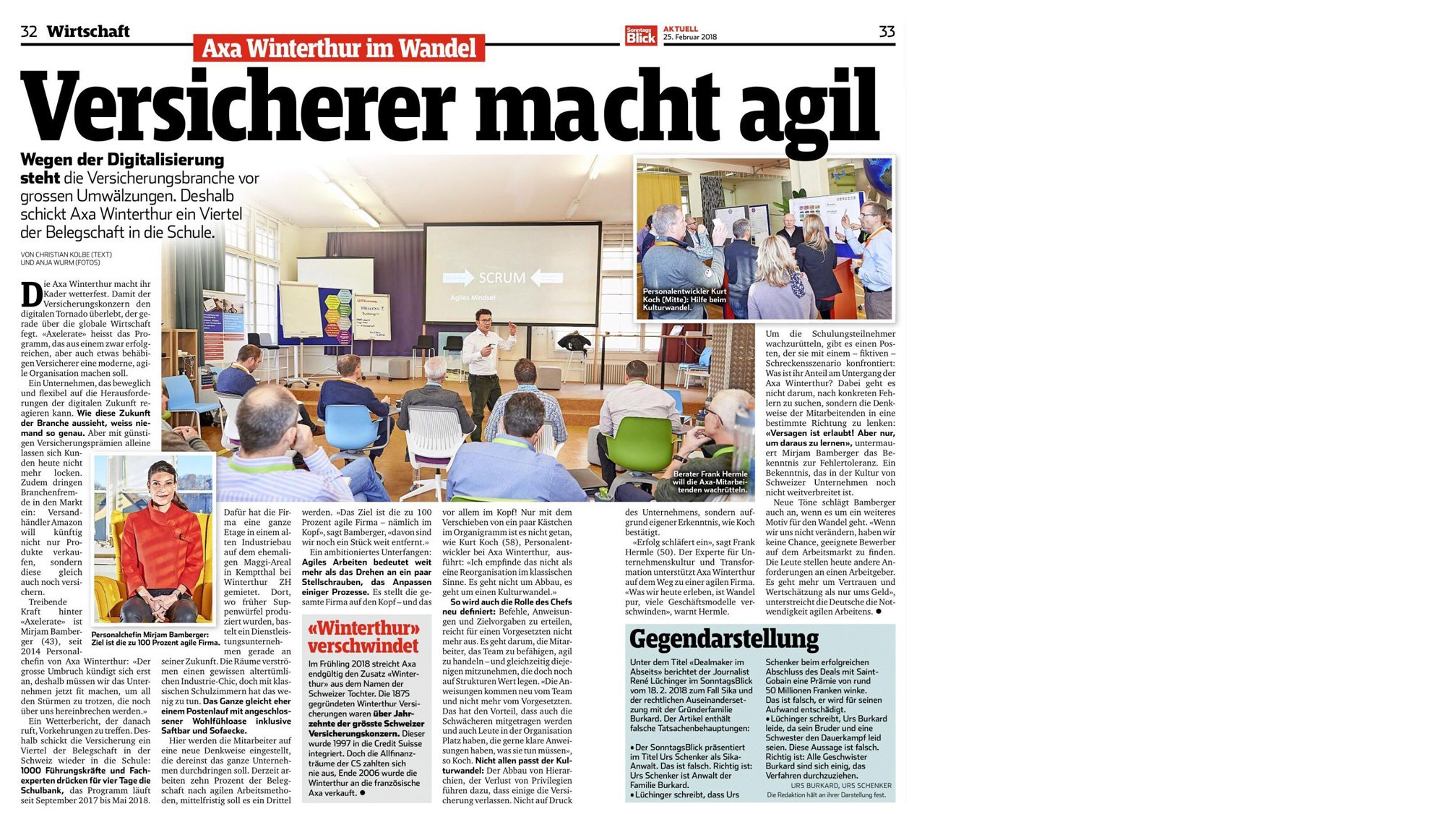At the Digital Leadership Day, Uwe Baumann, Head of Development and Transformation Axa Switzerland, and Simon Sagmeister report on the cultural transformation of Axa.

Insurance goes agile
Sonntags Blick | by Christian Kolbe (Text) and Anja Wurm (Photos) | 25.02.2018
Confronting digitalization, the insurance sector faces far-reaching changes. This is why Axa Winterthur is sending one in four of its employees back to school.
Axa Winterthur is weatherproofing its workforce to help the insurer withstand the digital storm sweeping over the global economy. “Axelerate” is the heading under which the successful but maybe slightly staid insurance company is to turn into a modern, agile organization.
A business able to respond in an agile and flexible manner to the challenges of the digital future – though nobody is quite sure what the future holds for the insurance sector. What is certain is that low premiums alone are not enough to attract customers. What is more, outsiders are edging into the market: Online retail giant Amazon is planning not just to sell products, but to ensure them as well.
Head of HR, Mirjam Bamberger, is the driving force behind “Axelerate.” The goal is a one hundred per cent agile company. Ms. Bamberger, who is 43, has been head of HR at Axa Winterthur since 2014. She says:
“The big transformation is only just rearing its head, which is why we need to get the company ready now if we’re to weather the storms that are gathering now.”
As a warning, this weather forecast deserves to be taken seriously, which is why the insurance is sending a quarter of its workforce in Switzerland back to school: 1000 executives and specialists are taking four-day courses, with the program running from September 2017 to May 2018. To make everything go smoothly, the company has leased and entire floor in a former factory building on the Maggi site at Kemptthal, near Winterthur. Once a production facility for bouillon cubes, the building now hosts a service company looking to shape its future. The vintage industrial chic of the rooms is one thing, but they bear little resemblance to classrooms as you might know them. The whole set-up rather resembles a scavenger hunt with the addition of a chill-out zone and a juice bar.
This is where staff are introduced to a new way of thinking, which ultimately is to permeate the company as a whole. At present, 10 per cent of the workforce use agile methods, the medium-term goal is a third. “The goal is a company that is one hundred per cent agile — as a state of mind,” says Bamberger. “We’ve still got a lot of ground to cover.”
An ambitious task indeed: Agile working means more than just adjusting a few controls or tweaking the odd process. It turns the entire company upside down – and above all in their heads! Just moving around a few boxes in an organization diagram won’t do the trick, as Kurt Koch (58), who works in personnel development at Axa Winterthur, explains:
“To me, this isn’t a classic case of reorganization. This is not about getting rid of something, it’s all about a change in culture”
The role of the boss, too, is up for redefinition: It’s no longer enough for leaders to give orders and instructions or to set targets. What counts is enabling staff, the team, to be agile — and yet not to leave behind those who value structure. “Now, instructions come from the team, and not from a superior. This has the advantage of carrying along weaker members and creating a space in the organization for people who prefer clear instructions what to do,” says Koch. Yet not everyone is pleased with the cultural change: Levelling hierarchies and the loss of entailed privileges make some people leave the company — yet not, as Koch confirms, because they are pressured to do so, but because it is their choice.
“Success can put you to sleep,” according to Frank Hermle (50), who is an expert in corporate culture and transformation at The Culture Institute, which is supporting Axa Winterthur on its way to becoming an agile business.
“What we’re witnessing today is change par excellence. Many business models are disappearing,” Hermle warns.
To wake up the participants in the seminar, at one station, they are confronted with a fictional but horrifying scenario: What was their part in the decline of Axa Winterthur? It is not about searching for specific mistakes, but about guiding staff to think in a particular direction: “There’s no shame in failure — if you learn from it,” as Mirjam Bamberger formulates her commitment to tolerating errors. Confessions of that kind are still rare im Swiss corporate culture. Ms. Bamberger, who is from Germany, strikes a similarly new note in discussing another motive for change: “If we don’t change, we’ll have trouble finding suitable candidates on the job market. People have different expectations of their employers these days. It’s more about being trusted and valued than just about money,” she explains. There is a need for an agile approach.